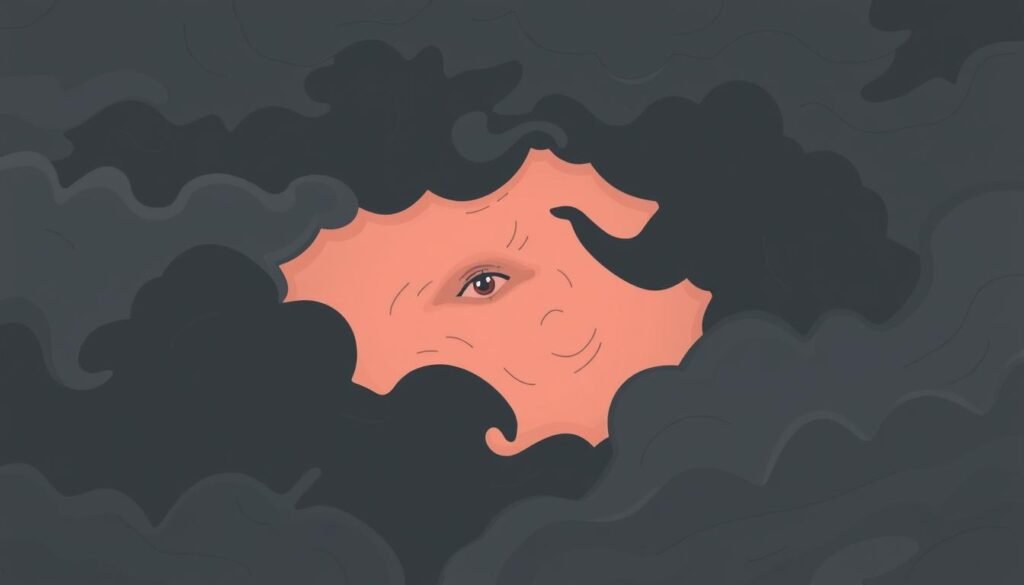An estimated 40 million adults in the United States suffer from generalized anxiety disorder. This fact is concerning given that anxiety doesn’t just affect the mind. It can also cause physical issues like nausea and stomach discomfort. Recognizing symptoms of anxiety-induced nausea is key to knowing when to get medical help. Knowing how anxiety and nausea are linked is important for a person’s health.
Anxiety has deep effects, leading to hard moments like nausea. This article will talk about why it’s important to know the signs of anxiety-induced nausea. It will help point out when medical attention is needed. Understanding these signs means people can confidently search for the right treatment for their anxiety nausea.
Key Takeaways
- Over 40 million adults in the U.S. live with anxiety disorders.
- Anxiety can trigger physical symptoms, including nausea.
- Understanding the connection can facilitate timely medical help for anxiety-induced nausea.
- Identifying specific symptoms can help distinguish anxiety-induced nausea from other causes.
- Effective treatments like cognitive behavioral therapy can alleviate symptoms.
- Consulting a healthcare provider is crucial for prolonged or severe nausea.
Understanding Anxiety and Its Physical Symptoms
Anxiety is a common reaction to stress. It shows various symptoms that may affect someone’s mental health deeply. Physical signs, in particular, can change how the body works.
When anxious, our body releases stress hormones like adrenaline and cortisol. This leads to symptoms such as a fast heartbeat, quick breathing, and lots of sweating. It can also make your stomach upset, causing nausea. Knowing these symptoms helps us find out what makes us anxious and see its effect on our health.
During a panic attack, anxiety’s physical side is very clear. These attacks can last 5 to 30 minutes and really interfere with everyday life. Anxiety can cause stomach problems, chronic pain, and trouble focusing. These issues can make mental health problems worse. For deeper information, check out comprehensive resources about anxiety symptoms.
Knowing the physical symptoms of anxiety helps people get help on time. Talking to someone and finding ways to cope can ease both mental and physical troubles. Understanding this link is crucial for handling mental health challenges early on.
What Causes Nausea with Anxiety?
Nausea often comes when you feel really anxious. This happens because your body releases hormones like adrenaline and cortisol. These hormones affect your whole body, particularly your digestive system. Signs you might notice are nausea, stomach cramps, and sometimes vomiting. These hormonal changes disrupt your stomach and intestines, leading to discomfort.
Anxiety and conditions like irritable bowel syndrome (IBS) are closely linked. IBS can make nausea worse. This shows how connected our minds and guts are. The causes of anxiety nausea differ from person to person. While some might feel a little queasy, others may deal with severe symptoms, like throwing up a lot.
When you’re anxious, you might feel nauseous over small things. This makes the nausea seem worse than it is. Anxiety changes how our neurotransmitters work, affecting our gut. Knowing this helps us see how anxiety and nausea are related.
To deal with nausea caused by anxiety, try things like mindfulness, deep breaths, and eating light meals. It’s also smart to talk to a doctor if your nausea won’t go away. For more information on how anxiety affects your body, including your stomach, click here.

Identifying Anxiety-Induced Nausea Symptoms
Anxiety affects our physical health in big ways. Nausea is a common sign of this impact. It’s important to recognize the symptoms of anxiety-induced nausea. This helps us tell it apart from other causes and manage it better.
Common Symptoms of Anxiety-Induced Nausea
Stressful situations often bring on symptoms of nausea due to anxiety. People might feel:
- Feelings of queasiness
- Upset stomach
- Loss of appetite
- Increased salivation
- A general sense of unease in the stomach
These symptoms often go hand in hand with anxiety attacks. When we’re stressed, our body prepares to fight or flee. This can reduce blood flow to our stomach and cause nausea.
How to Differentiate between Anxiety and Other Causes of Nausea
Figuring out the cause of nausea can be tricky, especially when anxiety is involved. Important things to look at include:
- When the nausea happens in relation to stress
- If there’s a fast heartbeat, muscle stiffness, or trouble focusing
- How long and how often the nausea occurs
If you’re often nauseous and it’s not due to anxiety, you might have a different health problem. Conditions like Irritable Bowel Syndrome or gastritis could be the cause. Knowing the pattern of your symptoms helps you get the right help.

| Symptom | Associated Condition |
|---|---|
| Queasiness | Anxiety |
| Upset stomach | Irritable Bowel Syndrome |
| Loss of appetite | Anxiety |
| Increased salivation | Anxiety |
| General unease | Meniere’s Disease |
When to Seek Medical Attention for Anxiety-Induced Nausea
Knowing when to get medical help can make a big difference when dealing with anxiety-induced nausea. Often, anxiety triggers nausea, but some signs need a doctor’s eyes. Noticing these signs helps you make smart choices about your health.
Signs That Indicate the Need for Medical Help
If nausea doesn’t go away and keeps bothering you, it might be time for a doctor’s visit. Here’s what to look out for with anxiety-induced nausea:
- Nausea lasting more than two days
- Unexplained weight loss
- Accompanied by severe discomfort or pain
- Recurring vomiting
Spotting these signs early can lead to quick help. Unexplained symptoms could mean more than just anxiety.
Immediate Medical Attention: Red Flags to Watch For
Some symptoms mean you need help right away. Keep an eye out for these urgent signs:
| Symptom | Urgency Level |
|---|---|
| Chest pain | High |
| Confusion | High |
| High fever | Moderate |
| Rectal bleeding | High |
Watching for these red flags helps you get care fast, avoiding bigger problems. Judge your symptoms’ severity wisely before seeking help. To learn more about anxiety and nausea, check out this helpful resource.

Effective Treatments for Anxiety-Induced Nausea
Combining different treatments is key for anxiety-related nausea. Medications and therapy can help those affected find relief.
Medications for Managing Anxiety and Nausea
There are many medicines for anxiety nausea. Antidepressants, like SSRIs, can help with anxiety. But, they might make nausea worse by raising serotonin levels. Other drugs, such as promethazine, focus on easing nausea and are good for anxiety-related stomach problems.
Therapies That Work: Cognitive Behavioral Therapy and More
Cognitive-behavioral therapy (CBT) is very effective for anxiety. It helps people change bad thought habits, reducing nausea. Other methods like acceptance and commitment therapy (ACT) or exposure therapy also help with anxiety. They tackle the mental and physical issues, including nausea.
| Treatment Type | Description | Benefits |
|---|---|---|
| Antidepressants (SSRIs) | A class of medications that can alleviate anxiety symptoms. | Effective for long-term management but may cause temporary nausea. |
| Promethazine | Medication specifically used to treat nausea and associated symptoms. | Provides immediate relief for nausea regardless of the underlying causes. |
| Cognitive Behavioral Therapy | Psychotherapy that focuses on changing negative thought patterns. | Helps reduce anxiety levels and associated nausea in the long run. |
| Acceptance and Commitment Therapy (ACT) | A therapeutic approach that emphasizes acceptance of thoughts and feelings. | Promotes mental flexibility, reducing the impact of anxiety-related nausea. |
Coping with Anxiety-Induced Nausea at Home
It’s tough to deal with nausea from anxiety. Still, home remedies exist to help ease the symptoms. Learning specific techniques can give you control back and help manage discomfort. It’s good to find out what works and bring mindfulness into your everyday life.
Techniques to Alleviate Nausea
Here are some helpful ways to lessen nausea from anxiety:
- Box breathing: Breathe in deeply for four counts, hold it for four, then exhale for four. It helps calm you down.
- Aromatherapy: Essential oils like peppermint or lemon can soothe you. Just smelling them might make you feel better.
- Ginger: Ginger tea or candies can fight off nausea. Ginger is a natural remedy.
- Physical activity: Light exercises, such as walking, boost endorphins. This can reduce your anxiety levels.
Mindfulness and Relaxation Strategies
Mindfulness can be a game-changer for anxiety and nausea. Using these methods can improve your mental and digestive health:
- Meditation: Taking time for meditation daily can cut down stress and anxiety. This may help with nausea too.
- Yoga: Gentle yoga mixes movement and breathing. It helps calm your mind and body.
- Deep breathing exercises: Simple exercises can ground you and bring peace.
Using these coping methods helps you understand your symptoms better. It also builds resilience against anxiety-related nausea. Through home remedies and mindfulness, you can improve your wellness and face anxiety stronger.
Seeking Professional Help for Anxiety and Nausea
Many people find anxiety-induced nausea overwhelming. Professional help offers a pathway to recovery. Mental health experts give strategies for anxiety and its effects.
It’s important to know anxiety can cause digestive symptoms. Patients can manage and relieve these effects by being proactive.
About 7–16% of people in the U.S. have irritable bowel syndrome (IBS). Also, 12% suffer from an upset stomach. Untreated anxiety can lead to depression. Symptoms like nausea and upset stomach link to the brain-digestive system connection. Chronic anxiety worsens these issues and may lead to more severe disorders.
People with anxiety may experience:
- Nervousness and restlessness
- Rapid heart rate
- Trouble sleeping
- Muscle tension
Watch for signs that nausea needs a doctor’s care:
- Chest pain or severe abdominal cramps
- Blurred vision or confusion
- High fever or extensive vomiting lasting over two days
- Unexplained weight loss
To manage anxiety-caused nausea, try different techniques. Use box breathing, belly breathing, journaling, exercise, and good sleep habits. Professional therapy or medication can also help a lot.
Getting professional help does more than ease symptoms. It helps you understand and tackle the root cause. It’s key to reach out for mental health support on this tough journey.
Preventive Measures for Avoiding Anxiety-Induced Nausea
Addressing anxiety-induced nausea can make life better. It means changing one’s lifestyle and having good support around. These changes help control anxiety and lower nausea.
Lifestyle Changes for Managing Anxiety
Making certain changes in one’s life can lift one’s spirits. Being active releases hormones that fight off anxiety. Eating healthy gives your brain the nutrients it needs, helping keep nausea at bay when anxious. Sleeping enough helps with emotion control and staying calm.
Practicing daily deep breathing helps reduce stress by calming the brain. Aromatherapy, using relaxing scents, is another way to ease anxiety and encourage calmness.
Building a Support System
Building relationships with people who care, like family or friends, boosts happiness. This connection can make one feel less alone. Talking to people who understand, or sharing your feelings, creates a healing space.
Writing down thoughts can ease anxiety and help one sleep better. Laughter is a powerful tool too; it releases substances that make us feel good. For more advice on handling anxiety and nausea, check out these tips on preventing anxiety-induced nausea
Conclusion
Understanding how worry causes nausea is key to handling it well. Over half the people with anxiety feel sick. It’s important to know this connection exists. Realizing that worry can make you physically ill is the first step to getting help. This is crucial when the sickness doesn’t go away.
Sometimes, feeling sick from anxiety goes away if you relax. Techniques like deep breathing help. But if the sickness gets worse or won’t leave, you need to see a doctor. Getting help can mean therapy or medicine. Both are good ways to deal with nausea caused by anxiety.
To live better, spot the link between stress and feeling sick. Focusing on good ways to cope, drinking water, and getting the right help matters. Remember, it’s normal to feel sick from stress sometimes. But, getting the right support is key to feeling okay again.